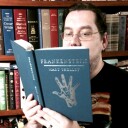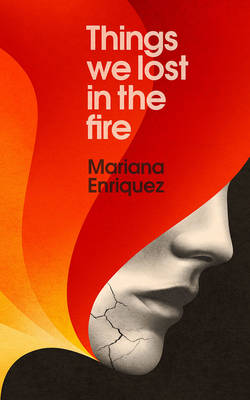
Michael @ Knowledge Lost
Written on Nov 8, 2017
It seems that 2017 was my year of reading books from Argentina. From the classic The Invention of Morel by Adolfo Bioy Casares to the beautiful reflection into libraries in Alberto Manguel’s essay collection The Library at Night. In more recent releases there was Savage Theories by Pola Oloixarac and of course the much hyped Fever Dream by Samanta Schweblin. These four books would have been enough to satisfy any reader, but there was one that stood out far more than these, and that was Things We Lost in the Fire by Mariana Enríquez. Translated by Megan McDowell, this collection introduced the English world to a great example of Argentine Gothic; however, this could easily fall into the horror genre.
What made this collection stand out is the way Mariana Enríquez was able to explore issues within Argentina without addressing the history directly. The beauty of using literature instead of journalism was the ability to offer social criticism and personal opinions in a stylised and entertaining way. Here we can read about the gruesome realities that many people live in Buenos Aires. Starting from the opening story “The Dirty Kid” which explores the fear a woman faces living alone in the slums. Not to mention the poverty, drug abuse, gang-related killings and even satanic rituals that surround her every day. In the translation notes by Megan McDowell she states that “Mariana Enríquez’s stories, Argentina’s particular history combines with an aesthetic many have tied to the gothic horror tradition of the English speaking world”. There are many of the tropes found in the horror genre including abandoned houses, supernatural elements, and body dismemberment or mutilation. However, it is not these, but the everyday situations that often terrify the reader.
For me, “The Inn” appears of one of the unsung heroes within the collection, it combines a real issue with a bizarre story. This story explores adolescent antics as the girls begin to explore their own sexuality. However, there is the lurking terror of the looming presence of the Alfredo Stroessner soldiers. Enríquez was able to explore the horror of unexpected terror in the time of the Paraguayan dictator. Hinting at the constant state of terror and the clandestine torture centres without mentioning them directly.
Mariana Enríquez has an amazing ability to explore so many issues without mentioning them. I am confident with a better understanding of Argentinian history, Things We Lost in the Fire is a completely different book. Exploring many themes from poverty to the corruption facing the country, but the biggest focus is the treatment of woman. You cannot really talk about this short story collection without spending time talking about the title story “Things We Lost in the Fire”, which explores the idea of women taking control of their own beauty in a rather unique way. The story leaves Silvina in the position to either betray her mother and the Burning Women movement or physically mutilating her own body.
This is the final story in the collection that not only sums up the underlying themes throughout the book but it also leaves you with this feeling that women must often be subjected to a choice where all choices are harmful, leaving her to pick the lesser of two evils. This story is the title story for a reason, if you only read one of the stories make sure it “Things We Lost in the Fire”. However, I do recommend the entire collection. It is a socio-political masterpiece, exploring the horrors and struggles of Argentina and women around the world. If you only read one short story collection in your life, make it Things We Lost in the Fire by Mariana Enríquez.
This review was originally published in the literary journal The Literati: https://literatimag.com/articles/book-review-things-we-lost-in-the-fire-by-mariana-enrquez
What made this collection stand out is the way Mariana Enríquez was able to explore issues within Argentina without addressing the history directly. The beauty of using literature instead of journalism was the ability to offer social criticism and personal opinions in a stylised and entertaining way. Here we can read about the gruesome realities that many people live in Buenos Aires. Starting from the opening story “The Dirty Kid” which explores the fear a woman faces living alone in the slums. Not to mention the poverty, drug abuse, gang-related killings and even satanic rituals that surround her every day. In the translation notes by Megan McDowell she states that “Mariana Enríquez’s stories, Argentina’s particular history combines with an aesthetic many have tied to the gothic horror tradition of the English speaking world”. There are many of the tropes found in the horror genre including abandoned houses, supernatural elements, and body dismemberment or mutilation. However, it is not these, but the everyday situations that often terrify the reader.
For me, “The Inn” appears of one of the unsung heroes within the collection, it combines a real issue with a bizarre story. This story explores adolescent antics as the girls begin to explore their own sexuality. However, there is the lurking terror of the looming presence of the Alfredo Stroessner soldiers. Enríquez was able to explore the horror of unexpected terror in the time of the Paraguayan dictator. Hinting at the constant state of terror and the clandestine torture centres without mentioning them directly.
Mariana Enríquez has an amazing ability to explore so many issues without mentioning them. I am confident with a better understanding of Argentinian history, Things We Lost in the Fire is a completely different book. Exploring many themes from poverty to the corruption facing the country, but the biggest focus is the treatment of woman. You cannot really talk about this short story collection without spending time talking about the title story “Things We Lost in the Fire”, which explores the idea of women taking control of their own beauty in a rather unique way. The story leaves Silvina in the position to either betray her mother and the Burning Women movement or physically mutilating her own body.
This is the final story in the collection that not only sums up the underlying themes throughout the book but it also leaves you with this feeling that women must often be subjected to a choice where all choices are harmful, leaving her to pick the lesser of two evils. This story is the title story for a reason, if you only read one of the stories make sure it “Things We Lost in the Fire”. However, I do recommend the entire collection. It is a socio-political masterpiece, exploring the horrors and struggles of Argentina and women around the world. If you only read one short story collection in your life, make it Things We Lost in the Fire by Mariana Enríquez.
This review was originally published in the literary journal The Literati: https://literatimag.com/articles/book-review-things-we-lost-in-the-fire-by-mariana-enrquez
